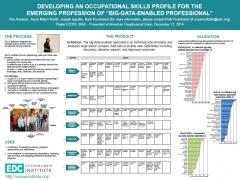AGU Poster on Developing an Occupational Skills Profile for the Emerging Profession of "Big-Data-Enabled Professional"
This poster was presented at the American Geophysical Union's (AGU) Fall meeting in 2014 to describe the DACUM process and present the finalized occupational profile.
Abstract:
In August of 2014, the Oceans of Data Institute at Education Development Center, Inc. (EDC) convened an expert panel to begin the process of developing an occupational skills profile for the “big-data-enabled professional.” We defined such a professional as an “individual who works with large complex data sets on a regular basis, asking and answering questions, analyzing trends, and finding meaningful patterns, in order to increase the efficiency of processes, make decisions and predictions, solve problems, generate hypotheses, and/or develop new understandings.” The expert panel included several geophysicists, as well as data professionals from engineering, higher education, analytical journalism, forensics, bioinformatics, and telecommunications. Working with experienced facilitators, the expert panel created a detailed synopsis of the tasks and responsibilities characteristic of their profession, as well as the skills, knowledge and behaviors that enable them to succeed in the workplace. After the panel finished their work, the task matrix and associated narrative were vetted and validated by a larger group of additional professionals, and then disseminated for use by educators and employers.
The process used is called DACUM (Developing a Curriculum), adapted by EDC and optimized for emergent professions, such as the “big-data-enabled professional.” DACUM is a well-established method for analyzing jobs and occupations, commonly used in technical fields to develop curriculum and training programs that reflect authentic work tasks found in scientific and technical workplaces. The premises behind the DACUM approach are that: expert workers are better able to describe their own occupation than anyone else; any job can be described in terms of the tasks that successful workers in the occupation perform; all tasks have direct implications for the knowledge, skills, understandings and attitudes that must be taught and learned in preparation for the targeted career.



